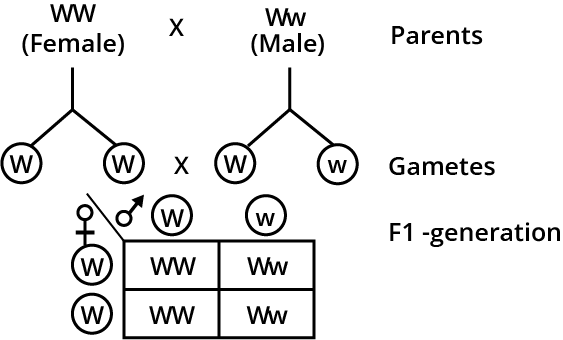Class 12 Biology Chapter 4 Question Answer Guide
FAQs on NCERT Solutions For Class 12 Biology Chapter 4 Principles Of Inheritance And Variation - 2025-26
1. What approach is recommended in NCERT Solutions for Class 12 Biology Chapter 4 to solve inheritance and variation questions as per the CBSE 2025–26 exam format?
NCERT Solutions emphasise a stepwise, scientific approach:
- State the question clearly and restate if necessary.
- Identify relevant genetic concepts (such as Mendel's laws, genotype, phenotype, Punnett square).
- Present step-by-step working, including labeled diagrams where helpful.
- Conclude with the final answer using CBSE-approved terminology.
2. How do NCERT Solutions for Class 12 Biology Chapter 4 help distinguish between dominant and recessive traits using real examples?
NCERT Solutions use examples like tallness (T) being dominant over dwarfness (t) in pea plants. They explain that dominant traits appear even when only one allele is present (heterozygous), while recessive traits are expressed only when both alleles are recessive (homozygous). Stepwise explanation through monohybrid cross diagrams helps clarify this distinction for students.
3. What is the best method for solving a dihybrid cross problem according to NCERT Solutions for Principles of Inheritance and Variation?
NCERT Solutions advise using these steps:
- Identify parental genotypes for both traits (e.g., seed shape and colour).
- Determine all possible gametes for each parent.
- Draw a Punnett square to combine gametes.
- Analyse the F1 and F2 generations for genotype and phenotype ratios.
4. How do NCERT Solutions guide students to accurately draw and interpret a pedigree chart?
NCERT Solutions provide clear steps for drawing a pedigree chart using standardised symbols for male, female, and affected individuals. They guide students on tracing inheritance across generations, identifying dominant, recessive, autosomal, and X-linked traits as required by CBSE.
5. What formula is used in Class 12 NCERT Solutions to determine the number of gametes from a heterozygous organism, and how is it applied?
The formula is 2n, where ‘n’ is the number of heterozygous gene loci. For example, an organism heterozygous at four loci can produce 24 = 16 types of gametes. NCERT Solutions apply this formula with worked examples for exam readiness.
6. Why is it important to understand the difference between Mendelian disorders and chromosomal disorders as highlighted in NCERT Solutions for this chapter?
NCERT Solutions stress this distinction because Mendelian disorders (like sickle cell anemia) result from single gene mutations, while chromosomal disorders (such as Down syndrome) are due to changes in chromosome number or structure. Understanding both is vital for identifying genetic disorders and answering CBSE application-based questions accurately.
7. How do NCERT Solutions for Principles of Inheritance and Variation address common misconceptions when solving genetic crosses?
They clearly differentiate between genotype (genetic constitution) and phenotype (observable trait), explain that not all traits show complete dominance, and warn against assuming independent assortment in cases of gene linkage, using solved examples to clarify each point.
8. What is the role of T.H. Morgan’s experiments as presented in the NCERT Solutions for Class 12 Biology Chapter 4, and how are they relevant for students?
NCERT Solutions cover T.H. Morgan’s work with Drosophila, which confirmed the Chromosomal Theory of Inheritance, demonstrated gene linkage, and crossing over. These concepts are essential for understanding exceptions to Mendel’s laws and are often tested in CBSE board exams.
9. In what way do NCERT Solutions connect principles of inheritance to real-life situations or medical genetics?
They include examples like human blood group inheritance, pedigree analysis for hereditary diseases, and case studies on sickle cell anemia. This helps students relate theoretical genetics to medical, diagnostic, and counselling scenarios, which is a growing focus in CBSE assessments.
10. How do NCERT Solutions for this chapter help students understand the importance of using standard terminology and diagrams in genetics answers?
NCERT Solutions model answers that strictly follow CBSE terminology and incorporate labeled diagrams like Punnett squares and pedigree charts. Using correct terms and visuals ensures answers are clear, precise, and score maximally in board evaluations.


























